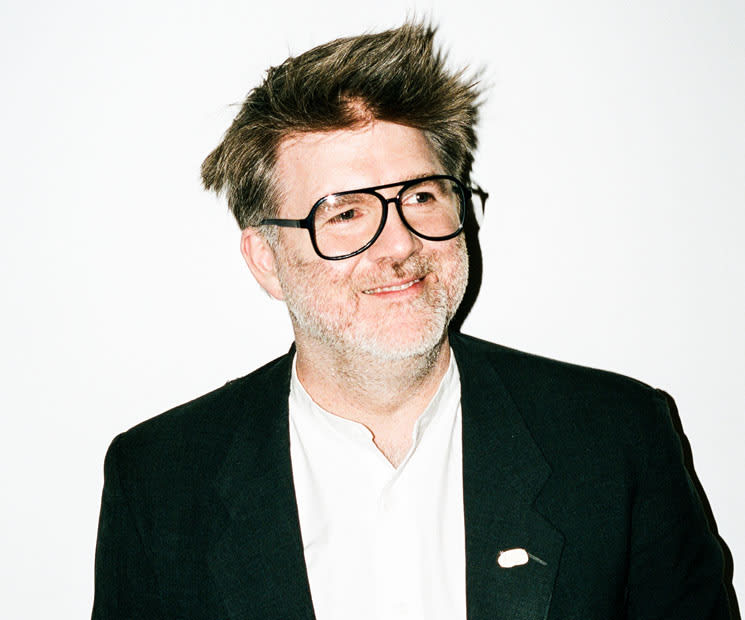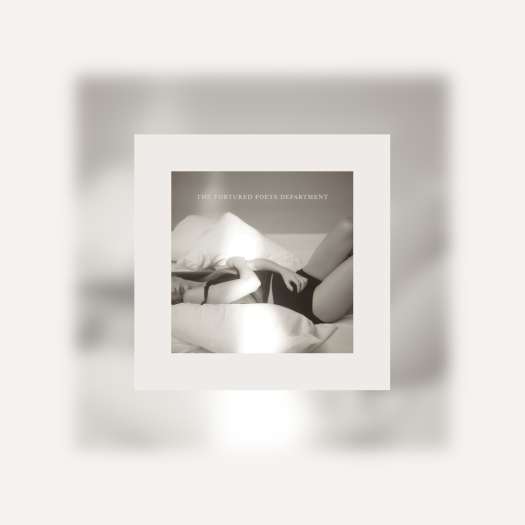On September 1, LCD Soundsystem will finally drop their comeback album, American Dream. And though it's been over seven years since their last record, frontman James Murphy is every bit the conversationalist he's always been; when Exclaim! sat down with the LCD mastermind for our cover story, he was open and eloquent about the making of the new LP.
While we covered many of the issues related to the band's retirement and return, there was lots more in our hour-long chat. Below, James Murphy talks respecting his fans, anxiety, mythology and how American Dream marks a new beginning for LCD Soundsystem.
1. Murphy has empathy for fans who felt hurt when, after going out with a very emphatic goodbye, LCD announced their return.
Murphy: "I've always felt, when dealing with the band, there's always been this overarching set of rules that is, 'What would my 15-year-old self think?' Since we started, since before we ever played a show, that's been it: 'Would my 15-year-old self be proud of liking my band? Would he still, as he got older, look back on that as a good investment, emotionally?' I've always used that. So when somebody has a 15-year-old self-style reaction — which I think getting mad is — I have a lot of empathy for that.
"I believe that the relationship between a band and the people who care about that band is almost entirely maintained by the people. The band itself doesn't do much; they just do what they're doing. The real work is being done by kids. My relationship with the Smiths was entirely maintained by me. It was my investment, my going and buying the record when I didn't have much money, my reading and obsessing about them. They had made the music, which is what they were expected to do, but the relationship work was mine.
"There are bands who are just like, great and wild and that's what you want from them, to be uncompromising, but that's not who I am. I like to communicate, so when I fail to communicate — when somebody gets upset — I feel like it's a failure of mine to communicate the right thing. It's on me, basically, within reason. For the most part, I want to make sure that I'm making an effort to honour and have some respect for the way people feel about our band."
2. Murphy used to suffer intense anxiety, but it's gotten better. American Dream was the least anxious he's ever felt while making an album.
"I think my life has been pretty linear with the exception of my 20s, which were just like… If you have a history, and then during a certain period there's just, like, a huge recession or a war, and life is just horrible for a while, I think my 20s were just… the adjoining nations were at war and you could no longer get fruits and vegetables and stuff. Other than that, to a certain degree in my life, anxiety and depression are a thing I was born with that I've just been able to chip away at as I've gotten older.
"So each record… The first record was really easy, because I was just like, 'Bllleeehh, I have nothing to lose, but then as soon as I had something to lose, that second record, Sound of Silver, was like... soul-destroying. I didn't work for weeks, and I'd rent a studio and be like… You know when you need to sleep, because you have to get up early in the morning, and then you start panicking because it's 3 a.m. and you haven't fallen asleep yet, and that keeps you wide awake? That was me making Sound of Silver. I was like, 'I've already paid for this studio week, and I've done nothing, and I can't think, and why am I doing this?!' That was really brutal. This Is Happening was less brutal, but I had some brutal moments; there was a week where I was like, 'Uggghhh.'
"But this time, I had a couple of bad days where a thing that I liked suddenly sounded terrible, but just knew, like, 'Oh, I'm crazy right now. I'm going to go home, rather than being crazy. I'm listening to something I know I liked, and it sounds bad to me right now. I'll come back tomorrow, and it will either be really bad and I'll move on, or it isn't bad and I'll keep working on it, or take away the bad bits. It's fine.' I never really got into a panic state, which is interesting, because it allowed me to make a darker record. Because I wasn't being stopped, I was able to hang onto that stuff — to hold my breath longer, if that makes any sense."
3. The band's process was the same as ever on American Dream; Murphy is something of a benevolent dictator.
"There's a reason I make music the way I make music; I'm not a good collaborator. I'm really not. I'm not flexible; I'm not open. It's emotional. I shut down. If I'm working with somebody, and I'm like, 'I want to do it like this,' but they're like, 'I want to do it this way,' I shut the fuck down. I just have to go home. I can't be in the room; I stress out. I don't want to hurt anyone's feelings, and I don't want to get into a debate about why it should be a certain way.
"LCD is set up in such a way that I get to do what I want to do, and that's it. There's no vote, no discussion about it. Since we all know that, there's a lot more room within that structure for actual collaboration than if I didn't make that clear. I'd be constantly trying to explain, like, 'Oh, don't play so much there,' constantly walking on eggshells. As it is, I can be like 'Hey Al, I need some guitar, I want it to be like this.' And Al, who is ten times the musician that I am, will let me at times take the guitar from him and [twists his arms to mimic playing badly], and then he'll do it! So we have this weird relationship, but it's incredibly gracious; everyone in the band is generous and willing to let me guide it.
"It's as if I'm the director of a film. I'm going to make my film, but to allow the actors to be free to do their jobs, there needs to be a set, other actors, and lines. It's more like that than anything else, because it would be impossible to make a film if every actor was like, 'Well actually…' It just wouldn't work. I make the best record if I'm just able to do what I need to do and everyone's just insanely generous and gracious enough to play the part that an inferior musician wants them to play. Pat's a better drummer than me; Al's a better guitarist and keyboardist than me; everybody's better than me!"
4. Bringing back the band wasn't an easy decision; a series of difficult ones led LCD Soundsystem to where they are now.
"I feel like myth can be really cheap. I'm not interested in that at all. I feel like the more naked and clear I am, the more I'm interested, the more I like it, the more I like being like, 'No, I don't mind being myself.' I have no problem being who I am, and us being exposed for who we are; I feel like de-mythologizing is much more the goal.
"No matter what we do, we're a band, and I'm not going to be in a bad or mediocre band to be anti-mythologizing — I want to be the best band we possibly can be, and make the best possible records — but if that comes with [mythology], people believing something about our band, what I want is for someone to understand, if they really love us and think, 'Oh that song is really great,' is that it wasn't made by people who are different than them. That's the only thing that I care about.
"My mother was very ill most of my life, and when she died, everyone was giving speeches at her funeral. They were like, 'She was so brave! Really brave.' And I got quite angry. My mom was not fucking brave — she was actually really scared, really chicken; she was afraid of dogs, afraid of water, of everything. And by saying she was brave, they were undermining the actual bravery that it took for her to live her life, because she was actually terrified and continued to do it anyway. I find that much more important. So I feel like, when people say, 'Oh well you're in LCD, you can do whatever you want,' that undermines and devalues all the things we've done, in my mind. That's not how we feel, that is not how it actually is. In fact, we're very normal people making decisions, and that's what makes them hard, and that's what's beautiful. That, to me, is what has meaning."
5. American Dream is the beginning of a new chapter for the band, and Murphy's excited.
"I feel like I made a trilogy [2005's LCD Soundsystem, 2007's Sound of Silver and 2010's This Is Happening], and I'm incredibly proud of it. There are three studio albums, and 45:33, and the London Sessions and Live at Madison Square Garden; that all feels of a piece. I feel like I took a nice, long breath and shed a lot of fatigue.
"Now, it's just the beginning. I have so much music, more music than I put on the record. And I'm eager to make another record. I have to be really cautious, because I want to do everything, and I tend to say yes to everything because I'm excited. But I want to make sure I don't tour so much that it takes me two-and-a-half years to get back in the studio. I want to be already working on another record."
American Dream is out September 1 courtesy of Columbia Records.
While we covered many of the issues related to the band's retirement and return, there was lots more in our hour-long chat. Below, James Murphy talks respecting his fans, anxiety, mythology and how American Dream marks a new beginning for LCD Soundsystem.
1. Murphy has empathy for fans who felt hurt when, after going out with a very emphatic goodbye, LCD announced their return.
Murphy: "I've always felt, when dealing with the band, there's always been this overarching set of rules that is, 'What would my 15-year-old self think?' Since we started, since before we ever played a show, that's been it: 'Would my 15-year-old self be proud of liking my band? Would he still, as he got older, look back on that as a good investment, emotionally?' I've always used that. So when somebody has a 15-year-old self-style reaction — which I think getting mad is — I have a lot of empathy for that.
"I believe that the relationship between a band and the people who care about that band is almost entirely maintained by the people. The band itself doesn't do much; they just do what they're doing. The real work is being done by kids. My relationship with the Smiths was entirely maintained by me. It was my investment, my going and buying the record when I didn't have much money, my reading and obsessing about them. They had made the music, which is what they were expected to do, but the relationship work was mine.
"There are bands who are just like, great and wild and that's what you want from them, to be uncompromising, but that's not who I am. I like to communicate, so when I fail to communicate — when somebody gets upset — I feel like it's a failure of mine to communicate the right thing. It's on me, basically, within reason. For the most part, I want to make sure that I'm making an effort to honour and have some respect for the way people feel about our band."
2. Murphy used to suffer intense anxiety, but it's gotten better. American Dream was the least anxious he's ever felt while making an album.
"I think my life has been pretty linear with the exception of my 20s, which were just like… If you have a history, and then during a certain period there's just, like, a huge recession or a war, and life is just horrible for a while, I think my 20s were just… the adjoining nations were at war and you could no longer get fruits and vegetables and stuff. Other than that, to a certain degree in my life, anxiety and depression are a thing I was born with that I've just been able to chip away at as I've gotten older.
"So each record… The first record was really easy, because I was just like, 'Bllleeehh, I have nothing to lose, but then as soon as I had something to lose, that second record, Sound of Silver, was like... soul-destroying. I didn't work for weeks, and I'd rent a studio and be like… You know when you need to sleep, because you have to get up early in the morning, and then you start panicking because it's 3 a.m. and you haven't fallen asleep yet, and that keeps you wide awake? That was me making Sound of Silver. I was like, 'I've already paid for this studio week, and I've done nothing, and I can't think, and why am I doing this?!' That was really brutal. This Is Happening was less brutal, but I had some brutal moments; there was a week where I was like, 'Uggghhh.'
"But this time, I had a couple of bad days where a thing that I liked suddenly sounded terrible, but just knew, like, 'Oh, I'm crazy right now. I'm going to go home, rather than being crazy. I'm listening to something I know I liked, and it sounds bad to me right now. I'll come back tomorrow, and it will either be really bad and I'll move on, or it isn't bad and I'll keep working on it, or take away the bad bits. It's fine.' I never really got into a panic state, which is interesting, because it allowed me to make a darker record. Because I wasn't being stopped, I was able to hang onto that stuff — to hold my breath longer, if that makes any sense."
3. The band's process was the same as ever on American Dream; Murphy is something of a benevolent dictator.
"There's a reason I make music the way I make music; I'm not a good collaborator. I'm really not. I'm not flexible; I'm not open. It's emotional. I shut down. If I'm working with somebody, and I'm like, 'I want to do it like this,' but they're like, 'I want to do it this way,' I shut the fuck down. I just have to go home. I can't be in the room; I stress out. I don't want to hurt anyone's feelings, and I don't want to get into a debate about why it should be a certain way.
"LCD is set up in such a way that I get to do what I want to do, and that's it. There's no vote, no discussion about it. Since we all know that, there's a lot more room within that structure for actual collaboration than if I didn't make that clear. I'd be constantly trying to explain, like, 'Oh, don't play so much there,' constantly walking on eggshells. As it is, I can be like 'Hey Al, I need some guitar, I want it to be like this.' And Al, who is ten times the musician that I am, will let me at times take the guitar from him and [twists his arms to mimic playing badly], and then he'll do it! So we have this weird relationship, but it's incredibly gracious; everyone in the band is generous and willing to let me guide it.
"It's as if I'm the director of a film. I'm going to make my film, but to allow the actors to be free to do their jobs, there needs to be a set, other actors, and lines. It's more like that than anything else, because it would be impossible to make a film if every actor was like, 'Well actually…' It just wouldn't work. I make the best record if I'm just able to do what I need to do and everyone's just insanely generous and gracious enough to play the part that an inferior musician wants them to play. Pat's a better drummer than me; Al's a better guitarist and keyboardist than me; everybody's better than me!"
4. Bringing back the band wasn't an easy decision; a series of difficult ones led LCD Soundsystem to where they are now.
"I feel like myth can be really cheap. I'm not interested in that at all. I feel like the more naked and clear I am, the more I'm interested, the more I like it, the more I like being like, 'No, I don't mind being myself.' I have no problem being who I am, and us being exposed for who we are; I feel like de-mythologizing is much more the goal.
"No matter what we do, we're a band, and I'm not going to be in a bad or mediocre band to be anti-mythologizing — I want to be the best band we possibly can be, and make the best possible records — but if that comes with [mythology], people believing something about our band, what I want is for someone to understand, if they really love us and think, 'Oh that song is really great,' is that it wasn't made by people who are different than them. That's the only thing that I care about.
"My mother was very ill most of my life, and when she died, everyone was giving speeches at her funeral. They were like, 'She was so brave! Really brave.' And I got quite angry. My mom was not fucking brave — she was actually really scared, really chicken; she was afraid of dogs, afraid of water, of everything. And by saying she was brave, they were undermining the actual bravery that it took for her to live her life, because she was actually terrified and continued to do it anyway. I find that much more important. So I feel like, when people say, 'Oh well you're in LCD, you can do whatever you want,' that undermines and devalues all the things we've done, in my mind. That's not how we feel, that is not how it actually is. In fact, we're very normal people making decisions, and that's what makes them hard, and that's what's beautiful. That, to me, is what has meaning."
5. American Dream is the beginning of a new chapter for the band, and Murphy's excited.
"I feel like I made a trilogy [2005's LCD Soundsystem, 2007's Sound of Silver and 2010's This Is Happening], and I'm incredibly proud of it. There are three studio albums, and 45:33, and the London Sessions and Live at Madison Square Garden; that all feels of a piece. I feel like I took a nice, long breath and shed a lot of fatigue.
"Now, it's just the beginning. I have so much music, more music than I put on the record. And I'm eager to make another record. I have to be really cautious, because I want to do everything, and I tend to say yes to everything because I'm excited. But I want to make sure I don't tour so much that it takes me two-and-a-half years to get back in the studio. I want to be already working on another record."
American Dream is out September 1 courtesy of Columbia Records.




